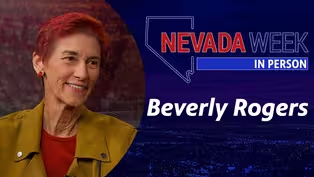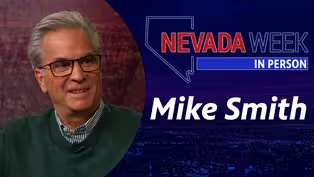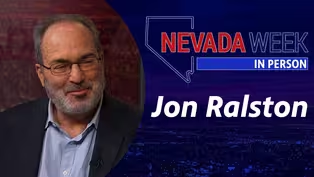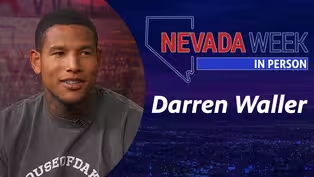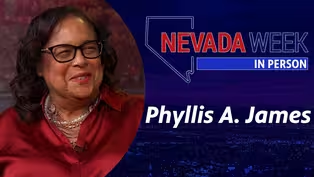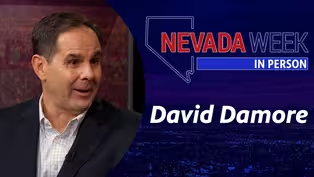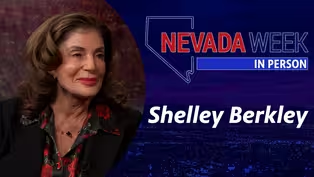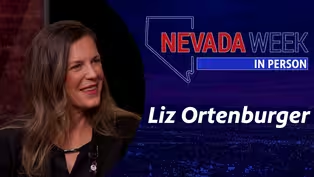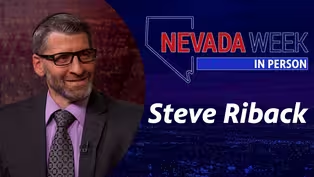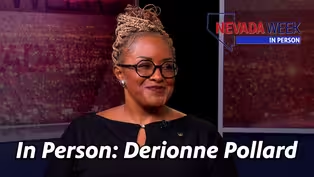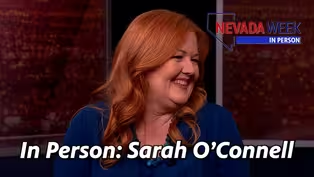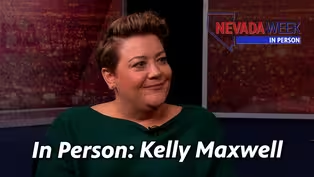
Nevada Week In Person | Ricardo Laguna
Season 1 Episode 18 | 14mVideo has Closed Captions
We talk one-on-one with professional BMX rider Ricardo Laguna.
We talk one-on-one with professional BMX rider Ricardo Laguna.
Problems playing video? | Closed Captioning Feedback
Problems playing video? | Closed Captioning Feedback
Nevada Week In Person is a local public television program presented by Vegas PBS

Nevada Week In Person | Ricardo Laguna
Season 1 Episode 18 | 14mVideo has Closed Captions
We talk one-on-one with professional BMX rider Ricardo Laguna.
Problems playing video? | Closed Captioning Feedback
How to Watch Nevada Week In Person
Nevada Week In Person is available to stream on pbs.org and the free PBS App, available on iPhone, Apple TV, Android TV, Android smartphones, Amazon Fire TV, Amazon Fire Tablet, Roku, Samsung Smart TV, and Vizio.
Providing Support for PBS.org
Learn Moreabout PBS online sponsorshipMore from This Collection
Nevada Week In Person goes beyond the roundtable discussion of Nevada Week with guests for a more casual conversation about their personal passions, new projects and compelling stories that are overlooked in the flurry of the news cycle.
Nevada Week In Person | Beverly Rogers
Video has Closed Captions
One-on-one interview with Rogers Foundation chair Beverly Rogers. (14m)
Nevada Week In Person | Mike Smith
Video has Closed Captions
One-on-one interview with Las Vegas Sun political cartoonist Mike Smith. (14m)
Nevada Week In Person | Jon Ralston
Video has Closed Captions
One-on-one interview with The Nevada Independent CEO Jon Ralston. (14m)
Nevada Week In Person | Darren Waller
Video has Closed Captions
One-on-one interview with Las Vegas Raider tight end Darren Waller. (14m)
Nevada Week In Person | Phyllis A. James
Video has Closed Captions
One-on-one interview Phyllis A. James. (14m)
Nevada Week In Person | David Damore
Video has Closed Captions
One-on-one interview with Chair of the Department of Political Science at UNLV David Damor (14m)
Nevada Week In Person | Shelley Berkley
Video has Closed Captions
One-on-one interview Senior Vice President for Touro University Shelley Berkley. (14m)
Nevada Week In Person | Liz Ortenburger
Video has Closed Captions
One-on-one interview with SafeNest CEO Liz Ortenburger. (14m)
Nevada Week In Person | Steve Riback
Video has Closed Captions
One-on-one interview with Las Vegas Metro Police Lieutenant Steve Riback. (14m)
Nevada Week In Person | DeRionne Pollard
Video has Closed Captions
One-on-one interview Nevada State College President DeRionne Pollard. (14m)
Nevada Week In Person | Sarah O’Connell
Video has Closed Captions
One-on-one interview with Director of Eat More Art LLC Sarah O’Connell. (14m)
Nevada Week In Person | Kelly Maxwell
Video has Closed Captions
One-on-one interview with Baby’s Bounty Executive Director Kelly Maxwell. (14m)
Providing Support for PBS.org
Learn Moreabout PBS online sponsorshipYou may have seen him on MTV or on his bike at a local park.
A model, a real estate investor, but first and foremost a professional BMX rider-- Ricardo Laguna joins me this week for Nevada Week In Person.
♪♪♪ Support for Nevada Week In Person is provided by Senator William H. Hernstadt and additional supporting sponsors.
(Amber Renee Dixon) From La Paz, Mexico, Ricardo Laguna moved to Las Vegas when he was 13, and at 18 he turned pro, taking his childhood passion of BMX riding and making it into a career.
Despite fame gained via performances all around the world, Laguna has made it a priority to give back to his local community.
Ricardo Laguna, welcome to Nevada Week In Person.
-Thanks for having me.
Wow, I loved this intro.
-You feel special?
-Yes, yes.
I'm going through a little bit of memory lane, that's for sure.
-Well, let's start there because I want to know how you discovered BMX riding, and how do you go about making that a career?
(Ricardo Laguna) Well, it all started when I turned 13.
My parents brought me to Las Vegas to celebrate my birthday and I ended up finding out that he got a job washing dishes at the Stardust Hotel and Casino.
-Your father?
-Correct.
So long ago, and the only place that we can find somewhere to live was in this trailer park.
So I wanted to make some friends.
I was riding this little mountain bike, and I saw these kids jumping out of a hole.
They said hey, we're riding BMX bikes.
And I was like I don't know what the sport is, but I want to tag along.
Who knows?
Two weeks later, they told me this big national was going to happen on the BMX track, and we went there and I was like a little kid in a candy store, and that passion became a career.
-How do you make that a career though, because I'm thinking okay, if you're going to become professional athlete, let's say a baseball player, you're playing for a team and you get a contract.
Is that how it works in your world?
-No, it's completely different.
So you have to move on through the rankings.
When you start racing, they have different levels in this actual league so it's all sanctioned, and now it's actually an event that is hosted at the Olympics.
So it's kind of cool that you have the tiers.
You have to build enough first places to get to the top.
Once you get to the expert level, then you have to rank enough points to become a professional.
-So there's BMX racing, and there is BMX freestyle.
Freestyle is what you specialize in.
-That's my bread and butter yes, but I'm actually making a little bit of a comeback into racing.
Right now as we speak, I'm the defending title champion for USA BMX, state champion for Nevada.
-When are you going to be competing next?
-It's coming up in two weeks.
We're going to be heading to Boulder City.
-Yes, but you told me that you hurt your shoulder recently.
-Well, I mean, sometimes you have to push through injuries.
This is the-- you know, everybody's like oh, I wish I could be you, you're so lucky.
It's like catch me on a bad day and let's see if you want to be me.
So I'm trying to rehab this shoulder, I have about a week left, and hopefully we can deliver.
-Speaking about injuries, you have been crucial in this community in promoting the use of helmets.
-Correct.
-Was there a moment in time you had a scary-- something happened where you thought oh boy, I better be wearing my helmet at all times when I am on this bike.
-Well, and this is one of the reasons.
We just did the 15th anniversary After Christmas Helmet Giveaway, and the idea is to fulfill a gap for a lot of families who either A, forgot to give their kids a helmet, or B, they couldn't afford it because they bought a skateboard, rollerblades, scooters.
This day and age, we share the skate parks with all sorts of devices, I guess is the best way to say it, or BMX bike.
So they can't afford it, and I was one of those kids.
My parents couldn't afford the proper equipment when I first started my BMX career.
So Las Vegas has been such a fabulous city, that the least I can do is be partnered with amazing people here in town like the Clark County School District Police Department, and we had the Del Sol Mariachi Band playing for us.
So we had a great event where they come and watch us ride bikes and they get a free helmet.
We don't care your size, your sport.
If you need a helmet, we give it to you and they teach you how to wear it properly.
-How many kids have you helped, I mean, on an annual basis?
-We average a little over a thousand because we gave away a thousand helmets, and there's been a couple of years that we run out and there's others we have a little bit less.
So we're just going to narrow it down to about a thousand.
-I know you know Connor Fields, the 2016 Olympic gold medalist in BMX riding, who had a terrible accident in this past Olympics.
He told the New York Times had he not been wearing a helmet, he thinks that he would have passed away, so it's an example of why it's so important.
Do you ever have trouble telling these kids I know it may not look cool-- or it is cool to wear it?
I don't think it doesn't look cool.
-Well, not to switch it back to just about me, I'm a guest speaker for the Clark County PAYBAC Program, and they say like we love your speeches.
Sometimes I feel like I might scare them, but I'd just rather, you know, give them the foundation and be like look, if you ride BMX bikes, injuries are going to come.
It's sad to say.
I don't care if you have the best or worst equipment because of what we do.
Any action sports or any traditional sports, if you're a fireman, injuries most likely are going to happen.
And not everybody wants to be a bike rider, not everybody wants to be a fireman or other jobs that the danger factor is a little greater.
That's why we need dentists, that is a lot safer, or an office person or a president, you know, where they can take a lot of passion on decisions.
So everybody can make your own decisions, and of course I have to tell them with my sport, injuries are going to come and go.
-You don't have to be worried about bragging about yourself, because you're so involved in the community on so many levels.
I mean, I read an article where you dressed up as an elf once alongside someone that was Santa Claus to hand out presents, and then also what about the community festival that you put on, Celebrando Hispanic Festival?
-There you go, yes.
-And 2014 was when that started.
-Correct.
Up to date we have $10,000 we've raised to different charity choices here locally.
And the idea was that I love doing events and I love doing my Action Sports world, but I just can't do it 365 days.
I was telling my publicist, if I have time to sleep, your job is in danger.
So I felt that-- I was getting ready to purchase a home and with the bad I made it good.
The deal fell through, and I had this money ready to be invested and I was like, what do I do?
So they didn't really have a Hispanic festival.
So we were talking with a friend and he was like why don't we invest your money into a Hispanic festival, and that's what we did.
So it's an event where we showcase the Hispanic culture with music, food and the whole nines, and at the same time generate money to help our community.
-Very cool.
And when you made your money, you could have moved away from North Las Vegas which is where you still live.
I've been to your house to interview you prior because you have a giant BMX park.
-I like to call it a training facility.
-Training facility in your backyard.
It's North Las Vegas, and it's kind of East Las Vegas too.
When you made your money, you could have moved to Summerlin or a fancy place in Henderson, but you chose to stay there.
Why, and what does that area mean to you?
-You know, John Lee, our mayor of North Las Vegas made me an honorary citizen of North Las Vegas, and I was very lucky for that.
And I told him, I'm like look, as you said I could move whatever I wanted, and I could probably afford whatever I dreamed of within my budget, and I felt like a lot of people that know me, some of the kids found out where I live just by lining up photos of like Google Maps when they type in North Las Vegas-- don't be doing that guys, by the way-- and then every time they're like wow, why do you stay here?
I just feel like my neighborhood, a lot of Hispanic people are there, and the people actually don't even know that I speak Spanish.
I'm like no, that's my first language.
So whenever they actually see me whether it's at the grocery store, because I have to buy like anybody else, because they freak out.
They're like, you buy your own groceries?
I'm like yeah, why?
So I think those are the moments when I'm all like, this is kind of cool that I stuck around the area where people think like I would never come out and they forget-- I'll put it as simple as this, which I'm not saying LeBron James wouldn't do this-- he wouldn't go to a typical basketball court in the neighborhood.
I go to my local skate parks.
So when the kids go like you're here and we're riding with you, it's kind of humbling for me because I'm like I'm just one of you guys.
So can I just stay and ride in my backyard and have the luxury?
Absolutely.
But by me hanging out with the kids, hopefully I can spark the hope of them being the next top rider.
-Yes, that representation is so important.
You had a reality show back in 2012 I think, and you did get to show off that area of North Las Vegas in it.
I understand that you are also working on a dream home at the moment that's going to have a much bigger BMX track in the backyard.
-Correct, yes.
I always look at the cup half full, and when COVID hit, sponsorships were dying, events were dying, and I was like well, I need to figure something else out, and I've been very fortunate.
At 20 years young, my parents taught me to invest your money.
Enjoy your money, but invest your money.
So I bought some real estate, and I was like interest rates are so low, money is so simple to get right now, so I pulled out all the money and I've been talking about it for years that if this lot ever was for sale I was going to buy it and, you know, the stars aligned.
So I'm building a compound that's going to be eight times bigger than what I have.
So four acres, the whole Strip view.
And I'm very blessed that my community, in the petition I have over 150 neighbors that want to see me build this development.
So we'll see where this goes.
It's been a long nine months in the process and I have yet to move a rock, but I think we're very close where I'm going to start going vertical and start grading stuff.
-When do you hope to have that completed by?
-I hate setting dates, but I hope within a year, year and a half.
That's the perfect Ricardo image.
-When did you buy your first piece of property in Las Vegas?
-I was 20 years old.
-So then what year was that?
-2001 or '02.
-Wow.
So you have seen the cycle, the rise, the fall and then now gosh, I mean, such a rise.
What have you learned from observing the Las Vegas real estate market?
-A good investor always invests when he runs his numbers and figures out-- you know, I always tell people a good market, bad market, can you afford it, get a good loan and pay for those 30 years, you're doing a good investment.
And that goes for real estate, but the same thing with bike riding.
I wish sometimes-- I'm too calculated.
I'd be like, I can probably do that trick and win the contest but I'd rather keep it safe for a third or fourth because we're here for a marathon, not for a sprint.
-Okay.
So you're using strategy, then.
You did date yourself though, with the age and when you bought your first property, so I want to come right out and say you're 39 years old, right?
-For about two more weeks.
-Okay, all right.
So are you becoming more calculated with your safety as far as BMX riding?
-You know, this is-- no, because you have to progress.
But now what I do is I invest in foam pits.
So basically you can learn the trick into this box of foam, land on your face, and most of the time it won't hurt because you land into foam versus doing it, you know, in the real jump.
Because back in the day for me to learn a jump, I would chop up the dirt, water it a little bit so it's a little soft and then the fall wouldn't hurt so bad.
So calculated of course, but the risk factor is still there because you have to keep up with the tricks we're doing in this day and age.
-So when it comes down to the real event then, there's no foam pit but you've had the opportunity to practice.
-That's why it's muscle memory-- you do it over and over.
I always tell people champions get made not in the spotlight but when you're training by yourself.
-Last question about real estate.
I read that you would like to have a show, a home improvement show.
It makes me think of Tim "the Tool Man" Taylor.
Do you remember him?
-Absolutely.
-Is that what you have in mind?
-Wasn't that with Mr. Wilson?
The guy, you never saw his face?
I totally know what you're talking about.
But no, I'm actually partnered with a good friend of mine.
She actually used to run vegas.com, and now she has her own interior design company.
So her and I, we work together and then her family is very close in helping her do all her interior designs.
With my parents, they help me maintain all my properties.
So the idea is the families come together and we showcase a home improvement show.
-Oh my gosh, Property Brothers, watch out.
-Hey, you never know.
-There may be some competition coming.
Okay, some rapid-fire questions for you.
-Uh-oh.
Can I stretch for this or do I just go?
-Well speaking of that, you have to have very strong legs, correct, for BMX riding.
Why is that?
-Well, we do a lot of plyos.
That's one of my regimen workouts because you have to be explosive, and then you need that power.
With us it's 30 seconds, and then freestyle is probably less than 15 seconds, so you need to be the strongest and the most explosive with that short amount of time.
-And you're never actually sitting on your seat.
-No.
Technically our seat is there for looks.
-Best BMX park in Southern Nevada.
-Oh, Craig Ranch Regional Park.
Let me tell you, they did an amazing job there.
It's one of the biggest ones in the whole state, believe it or not, and it keeps growing.
The word on the street is that we might be doing a pump track pretty soon.
You didn't hear it from me.
-What is a pump track?
-A pump track is basically hurdles that you basically pump.
You never pedal, you can maintain speed or gain more speed.
-Very cool.
Best restaurant in Las Vegas.
-Oh, Maggiano's.
No, not Maggiano's-- I just went and I lost their name.
Right next to the Bellagio from the-- I lost her name.
Giada's.
I don't know why I got it confused.
-Got it.
Well, you're making me hungry.
Thank you so much, Ricardo Laguna, for coming in.
To watch the latest episode of Nevada Week, go to vegaspbs.org/nevadaweek.
You can also tune in on Sunday at 5:30 or Tuesday at 7:30.
♪♪♪

- News and Public Affairs

Top journalists deliver compelling original analysis of the hour's headlines.

- News and Public Affairs

FRONTLINE is investigative journalism that questions, explains and changes our world.












Support for PBS provided by:
Nevada Week In Person is a local public television program presented by Vegas PBS
